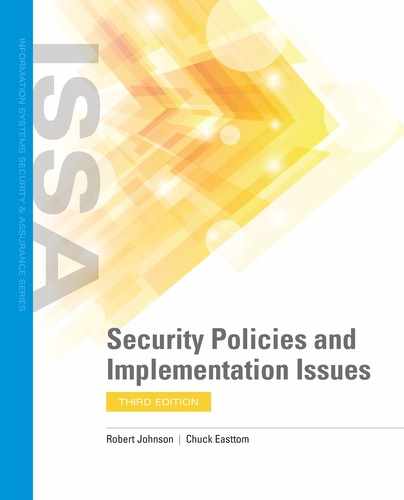Incident Response Policy
An incident response team (IRT) is a specialized group of people whose purpose is to respond to major incidents. The IRT is typically a cross-functional team. This means the people on the team have different skills. They are pulled together in a coordinated effort. In many organizations, the IRT is formed to respond to major incidents only. Minor incidents are often managed as part of normal operations. When the team is called together, the IRT is said to be “activated.”
It would not be practical to activate the IRT for minor incidents. Policy infractions, for example, are handled by an individual’s manager or, if need be, by someone in the security department. Suppose an employee shares his or her password with a second employee. This might occur when that second employee has been approved but is waiting for access to be granted. An incident report may be required in this case, but the IRT would not be activated. Normally, incident response teams are only activated for incidents that require a response that is both immediate and requires the resources of multiple individuals focused on the incident.
The incident response policy must be clear and concise to prevent ambiguity in the response process. The policy must define what an incident is versus an infraction. The policy must define the criteria for activating the IRT. There should be a centralized incident notification process so that appropriate individuals are aware of incidents. These individuals can then decide about whether to declare a disaster. Most important, the policy and related processes must enable the IRT to respond to incidents quickly. From the point an incident is detected to the point the IRT is activated, as little time should pass as possible. Organizations cannot afford to be slow to respond to an active attack.
There are many types of security incidents. When to declare an incident and activate an IRT depends on the organization’s policy. This chapter focuses on major information security breaches. Major breaches can include incidents such as systems breached from the outside, internal fraud, or a denial of service attack.
What Is an Incident?
An incident is any event that violates an organization’s security policies. An incident may disrupt normal operations of an application, system, or network. An incident may result in a reduction in quality of service and in service outages. These outages may require the activation of a recovery plan. An incident may also result in unauthorized access to or modification of data.
Examples of security incidents include:
- Unauthorized access to any computer system
- A deliberately caused server crash
- Copying customer information from a database
- Unauthorized use of computer systems for gaming
It is important that a formal incident definition is included in the incident response policy. This definition is then used to support processes for declaring an incident and activating the IRT.
